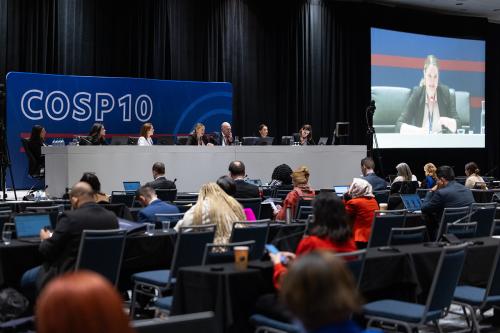Pandemic highlights the potential of Collective Action for integrity in healthcare

The global disruption from covid-19 to health and economic systems has magnified risks to preserving business integrity that will have longstanding impact. As a result, the pandemic is drawing significant attention to several of the world’s largest Collective Action initiatives that are reinforcing ethical business conduct in healthcare. The timing and actions of these initiatives could not be more critical in our crisis recovery efforts.
Health sector challenges and their implications for integrity
Diverse healthcare actors are confronted with enormous demands in responding to the virus while simultaneously facing suppressed demand for products and services unrelated to the pandemic. They must respond to a rapid strain of understood and novel challenges while maintaining patient and customer trust. These challenges include:
- the emergence of bad-acting opportunists;
- a rise in fraud due to emergency government procurement;
- supply chain and travel disruptions inhibiting third-party due diligence; and
- new sector entrants who may have good intentions but are unfamiliar with norms in ethical conduct.
These obstacles and others to upholding business integrity are unlikely to abate once the pandemic subsides, as societies reopen and many health organisations endeavour to play “catch-up” for lost time. In the absence of proactive coordination and safeguards, it is alarming to consider the collective implication of these challenges across the world.
Integrity mechanisms for healthcare actors
Fortunately, across much of the developed and developing world, there has been substantial investment over the past decade by international, national, and sub-national actors – private and public alike – to forge and implement Collective Action initiatives for integrity in healthcare. To start, private health-related enterprises – from medical technologies and pharmaceuticals companies to service providers and insurers – are among the most ethically codified industries worldwide. Several of these health industries have upheld international and nationally harmonised codes of ethics and other collective guidance since the 1980s, implemented through training and certification/enforcement mechanisms, and strengthened over time.
Several Collective Action initiatives also surfaced at the national level in the 1990s and 2000s, such as the Transparency Agreement in Mexico (2007) and the Marketing Code Authority in South Africa (2010) bringing the private sector together with other health actors in a common cause to uphold integrity.
Inspiring examples of Collective Action in the health sector
It is only in recent years however that we have seen patchwork approaches give way to the emergence of large-scale, effective and international Collective Action to bolster integrity in healthcare. Here are some examples:
1. Business Ethics for APEC SMEs Initiative
Launched by the United States in 2011 with universal support from the member economies of the Asia-Pacific Economic Cooperation forum (APEC), the Business Ethics for APEC SMEs Initiative is today the world’s largest public-private partnership to strengthen ethical business practices in the medical device and biopharmaceutical sectors. The initiative fosters implementation of the APEC Kuala Lumpur Principles and the APEC Mexico City Principles for each sector on a multi-stakeholder basis and remains the only international ethics guidance in healthcare recognised by heads of state. The APEC region has seen near-universal uptake in aligned codes of ethics across these industries as a result. A range of additional programmes under this Initiative has strengthened the resilience of healthcare actors in the region by helping them adhere to high-standard ethical conduct.
2. Consensus Frameworks for Ethical Collaboration
In 2014, the world’s leading bodies serving patients’ organisations, healthcare professionals and the pharmaceutical industry formed the first Consensus Framework for Ethical Collaboration. This agreement establishes a long-term platform for collaboration on existing and emerging challenges to upholding business integrity. From 2016–2019, eight countries have adapted the consensus framework approach for their health systems, unifying more than 200 parties serving thousands of companies, hundreds of thousands of professionals and millions of patients.
Among these, the Australian Ethical Health Alliance, with more than 70 parties, stands out as an exceptional model for unified commitment and coordination across the nation to align and strengthen ethical conduct.
3. Inter-American Coalition for Business Ethics in the Medical Technology Sector
The Inter-American Coalition for Business Ethics in the Medical Technology Sector, having facilitated universal code of ethics adoption and alignment by every medical device industry association in the Americas from 2017 to 2019, is working closely with governments and international institutions, such as the Inter-American Development Bank, to further the goals of the Lima Commitment for Democratic Governance against Corruption. The Coalition is vocal in reinforcing business integrity in medical products amidst covid-19 together with the Americas Business Dialogue.
4. Ethical Principles in Health Care
Ethical Principles in Health Care (EPiHC) were also announced in June 2020 for all private healthcare providers, payors and investors worldwide. Developed by the International Finance Corporation, a member of the World Bank Group, EPiHC provides healthcare organisations with principles and tools to navigate ethical decisions. It could not come at a better time amidst the pandemic. Private providers, payors and investors of any size and location can become an EPiHC signatory by visiting the initiative home page.
More inspiration on the B20 Collective Action Hub
All of these Collective Action initiatives furthering integrity in healthcare amidst covid-19, and many more, are featured on the Basel Institute’s B20 Collective Action Hub which serves as an exceptional resource in furthering international coordination across diverse stakeholders.
What’s around the corner for integrity in healthcare?
How the integrity of healthcare systems and the ethical conduct of stakeholders emerge from the pandemic will depend a great deal on the success of these and other major Collective Action initiatives. Will standards for business integrity in healthcare decline or fracture? Will most economies return to a pre-crisis status quo? Or will best practices across our health systems re-emerge stronger than ever before?
We believe it is imperative to build back better by leveraging these international Collective Action initiatives, particularly as emerging ethical dilemmas in healthcare – from artificial intelligence to data sharing – lie right around the corner.
About the authors
Andrew Blasi is a director at Crowell & Moring International and advocate for business ethics and integrity. He is a member of the Business 20 (B20) Task Force on Integrity and Compliance. Katherine Nunner is a senior consultant at Crowell & Moring International. Andrew and Katherine support several of the world’s largest Collective Action initiatives to strengthen business integrity in health, including several of those indicated in this article.



